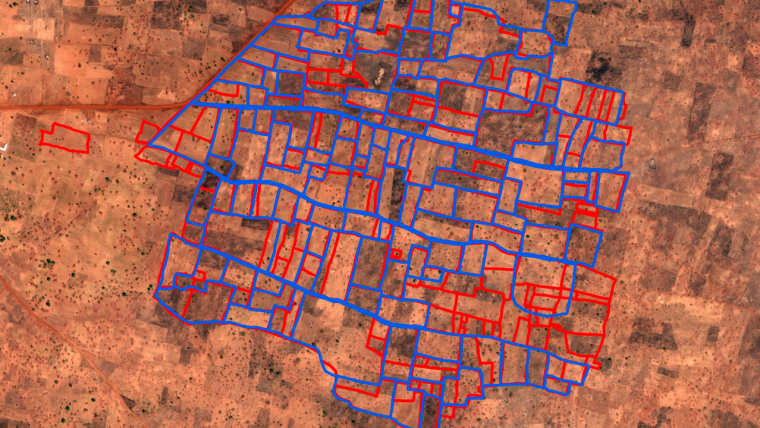Providing secure land rights at scale
Insights into the latest FFPLA innovations and implementations
A special issue of the 'Land' journal highlights the latest Fit-For-Purpose Land Administration innovations, demonstrating that FFPLA is increasingly gaining momentum and acceptance.
The Fit-For-Purpose Land Administration approach, which was first formally conceptualized around five years ago, is now gaining momentum and growing in acceptance across the land sector. This is documented in a new special issue of the 'Land' journal highlighting the latest FFPLA innovations and implementations from approximately 20 countries around the world.
The phrase ‘fit for purpose’ is commonly used for any intervention or activity that is appropriate, and of a necessary standard, for its intended use. The Fit-For-Purpose Land Administration (FFPLA) concept was developed in response to the lack of security of tenure in most developing countries, where up to 90% of the land and people are outside of the formal land administration systems. This mainly favours the elite. The concept includes three core components: the spatial, the legal, and the institutional frameworks. Each of these components includes the relevant flexibility to meet today’s actual needs, and can be incrementally improved over time in response to societal needs and available financial resources. The FFPLA approach is participatory in data capturing, affordable for governments to establish and operate, and attainable within a relatively short time frame.
The FFPLA approach is already triggering an influential change towards providing secure land rights at scale and providing greater social equity, leaving no one behind. These are the key findings in a special issue of Land, collated from 26 articles focusing on various aspects of the FFPLA approach and its application. One group of articles discusses various conceptual innovations related to the spatial, legal and institutional aspects of FFPLA and its wider applications within land use management. The other group focuses on case studies from a range of countries around the world, providing evidence and lessons learned from the FFP implementation process.
The FFPLA special issue
The main motivation for the special edition of Land was to share experiences and research into the FFPLA approach in order to help accelerate its implementation at scale and quickly resolve the global insecurity of tenure crisis. Indeed, the articles illustrate the significant progress that has been achieved over the past decade. They provide some very encouraging lessons learned, as well as exciting, innovative technologies to inspire land professionals to achieve the challenging objectives of the Sustainable Development Goals (SDGs). Although Land is a scientific publication, the range of topics (see Table 1) within the special edition will also be of great interest to decision-makers and professional land practitioners.
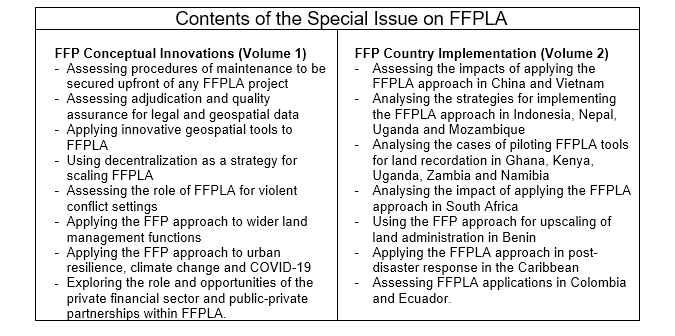
The articles are published on an open-access website and also in a two-volume book (see Figure 1). A few highlights from the wide range of articles addressing FFPLA innovations and country implementations are provided below (see Figure 2).
Volume 1: Conceptual Innovations
Private-sector FFP Land Financing. Purchase of land for informal settlers can be facilitated through loans managed by private institutions. In the case of Brazil, a private social enterprise (Terra Nova) acts as a coordinator and broker for buying out the underlying private owners at discounted values and coordinating with municipal governments to provide infrastructure. This has demonstrated that the concept of FFP land regularization can be widened to include FFP land financing with relevance for wider efforts in informal settlement regularization and upgrading. An analysis of parcel-level repayments to land owners and property price data provides some evidence of the sustainability of the business model and the increase of property values of the regularized parcels (pre-COVID-19). Since 2001, the private social enterprise has regularized over 20,000 informal parcels, primarily in São Paolo and Curitiba, and it is contended that the approach is widely replicable. Another case study from Côte d'Ivoire shows that similar innovation is taking place with new FFP Public-Private Partnership (PPP) models, including partnerships involving consortia of food industry leaders and private land documentation firms.
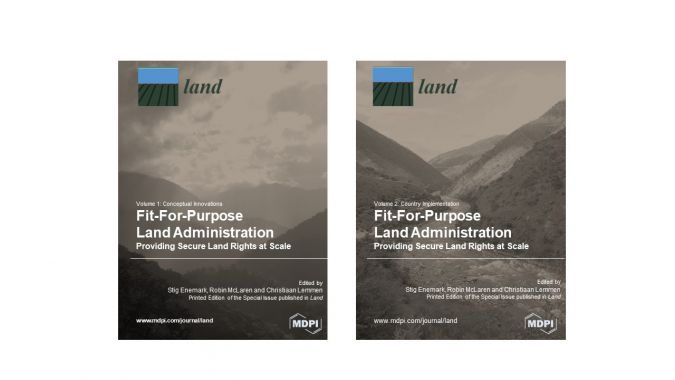
The Wider FFP Approach. The FFP approach has predominantly been applied to the land tenure aspects of land administration but can be expanded into a wider set of land management functions as has been verified by three World Bank urban case studies focusing on land valuation, housing resilience and waste management. Machine learning techniques can extract information, such as about building materials, from drone and street-level imagery to produce minimum viable product models to support these applications, as well as land tenure. Interestingly, there is a common set of geospatial datasets that can be captured once and shared across many other FFP land management functions in an urban environment. This will allow the current single land intervention projects to be holistically integrated into a wider programme of land management functions and deliver greater benefits to society much earlier.
Volume 2: Country Implementations
National FFPLA Strategies in Uganda and Nepal (see Figure 3). The GLTN publication ‘Fit-For-Purpose Land Administration: Guiding Principles for Country Implementation’ provides countries with guidance on how to formulate FFPLA implementation strategies. The special edition provides excellent in-depth examples from several countries where FFPLA national strategies have been created. Uganda has over 23 million unregistered parcels with varying tenure types and Nepal has over 10 million. Both countries implemented several pilot projects in order to identify how lessons learned from these case studies could inform the FFPLA implementation strategy in terms of building the spatial, legal and institutional frameworks. They found that the pilot projects provided opportunities to explain the benefits and obtain the necessary political, community and stakeholder support. This resulted in a national dialogue and consensus among all stakeholders and was a very promising way of advancing the FFPLA concept and creating a country implementation strategy. These approaches are building on the experience of significant early FFP programmes implemented in China and Vietnam.
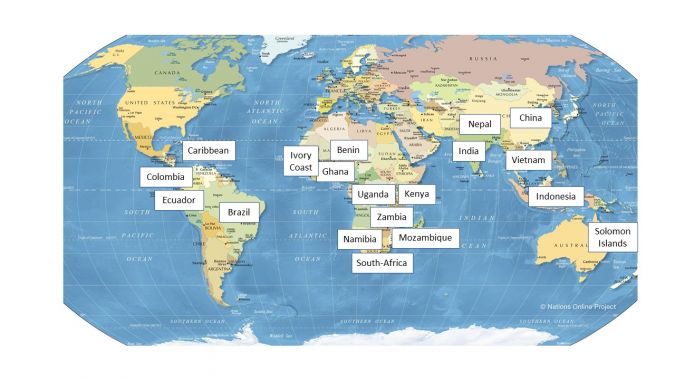
Assessing FFP Approach for South Africa. The Surveyor General investigates whether South Africa could adopt FFPLA to provide security of tenure to the five million land occupants who exist outside the formal land tenure system on communal land, in informal settlements, in resettled communities, in off-register housing schemes, and as farm dwellers, labour tenants and other occupants of commercial farms. The case study demonstrates how adjustments to the institutional, legal and spatial frameworks could develop a fully inclusive, sufficiently accurate land administration system that fits the purpose for which it is envisioned. The existing land tenure complexities, shaped by the evolution of land tenure systems in South Africa, are highlighted through the institutional, legal and spatial framework lenses. There is optimism that the adoption of the FFPLA approach with political support, trust built through community participation, and endorsement of the approach by land professionals will provide security of tenure that is beneficial and acceptable to all. There are many positive aspects already in place and no outstanding issues that are insurmountable. Solutions proposed for South Africa may well find application in many other countries.
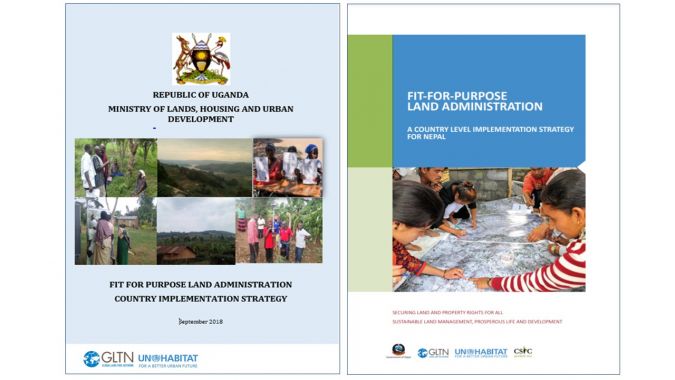
Lessons learned
The articles offer a mixed overview of experiences, developments and implementations. This results in some promising lessons learned and key experiences, including:
- The FFPLA pilot projects are easy to implement, well accepted and understood by the local community.
- By using a participatory approach and working in parallel throughout the country, FFPLA national projects can be completed at affordable costs of less than US$10 per parcel and within a few years. In principle, this is a national top-down approach that requires strong political will and support from key senior civil servants.
- Technological advancement is a key driver in terms of providing the relevant mapping and registration tools, e.g. machine learning to extract information from drone and street-level imagery.
- Innovative financing can be obtained, e.g. through new types of PPPs and private-sector support for regularization and upgrading of informal settlements.
- The FFPLA approach is unfolding beyond providing security of tenure, e.g. for mitigating land issues in violent conflict settings and for wider land management functions such as valuation, urban resilience, climate change and pandemics.
The FFPLA approach is gaining momentum and acceptance within the land professional community – including among the younger generation – as a game changer in achieving key aspects of the global agenda (the SDGs) towards greater social equity, leaving no one behind.
Further reading
Enemark, S.; McLaren, R.; Lemmen, C. (editors) Fit-For-Purpose Land Administration Providing Secure Land Rights at Scale, Volume One: Conceptual Innovations, Volume Two: Country Implementation MDPI, Basel, Switzerland, 2021
Enemark, S.; McLaren, R.; Lemmen, C. Fit-for-Purpose Land Administration: Guiding Principles for Country Implementation; GLTN; UN-Habitat: Nairobi, Kenya, 2016

Value staying current with geomatics?
Stay on the map with our expertly curated newsletters.
We provide educational insights, industry updates, and inspiring stories to help you learn, grow, and reach your full potential in your field. Don't miss out - subscribe today and ensure you're always informed, educated, and inspired.
Choose your newsletter(s)
